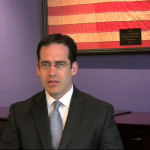Reposted by arrangement with Think Progress
While last night’s Republican debate offered few surprises as the primary field wrapped themselves in the legacy of Ronald Reagan and roundly denounced the Obama administration’s fiscal, foreign, and social policies, Ron Paul stood out with his unique views on the border fence endorsed by Mitt Romney, Michele Bachmann, and Herman Cain. Paul said:
- I think this fence business is designed and may well be used against us and keep us in. In economic turmoil, the people want to leave with their capital. And there’s capital controls and there’s people control. So, every time you think of the fence keeping all those bad people out, think about those fences maybe being used against us, keeping us in.
Watch it:
Paul’s embrace of extreme right-wing conspiracy theories about a U.S. government which enslaves its citizens is even more visible in his disgust with FEMA and his answer to a question at the Ames Straw Poll about whether “HR 645 [The National Emergency Center Establishment Act] could lead to detainment camps for American citizens during martial law.” He responded:
- Yeah, that’s their goal, they’re setting up the stage for violence in this country, no doubt about it.
The belief that FEMA, or various other government agencies, might be planning to restrict the movements of Americans or turn sections of the U.S., if not the entire country, into a detainment camp is traced back to the 1950s and, in the 1990s, the far-right “Patriot”/militia movement.
Chip Berlet, a senior researcher at Political Research Associates, told ThinkProgress:
- The main font of this [FEMA roundup conspiracy theory] is in the John Birch society publications since the 1950s. The John Birch Society is where Glenn Beck and a lot of the right wing talk radio hosts gets their conspiracy theories. The conspiracy theory was picked up by the antisemitic Spotlight newspaper and the Christic Institute, a progressive, anti-CIA group. In the 1990s the militia movement takes the theory.
While the “American concentration camp” meme has been debunked numerous times as a conspiracy theory coming out of various extremist movements, the sinister anti-government rumors dating back as much as 60 years seem to have found a spot at the table at last night’s Republican debate. Berlet doesn’t see much hope for an end to the FEMA roundup conspiracy theory, telling ThinkProgress:
- The conspiracy theory grooms you to be afraid of the government, makes you acept laissez-faire ideas of government involvement, and puts you in an apocalyptic mindset. You still have people to this day who take it so far they form militias and you have people in the John Birch society who say don’t take it so far but still promote the FEMA roundup conspiracy theory.





Where on earth did you get concentration camps from this video? His stance has always been on personal freedoms and merely pointed out that stronger border controls makes it more difficult for normal citizens to leave the country.
Okay, maybe. The impression some of us (me included) got was that he was buying into the well-known conspiracy theory that the government is prepared to suspend civil liberties and intern certain segments of the population — in this case, persons wanting to leave the country with their capital. Maybe he wasn’t thinking of that particular conspiracy theory. But what he says on the video is equally kooky.
I’ve voted for Paul and appreciate the earnestness and frankness he exemplifies. I may vote for him in the primary, again. I don’t agree with him on many of his positions, though he is essentially a lone voice on a more realist foreign policy, toward prohibition on many fronts, protecting civil liberties and limiting our domestic police state.
Those are issues I suspect unites progressives and libertarians alike. Until we’re willing to unite against the duo-poly and cast 3rd party votes, they’ll never pay us any mind.